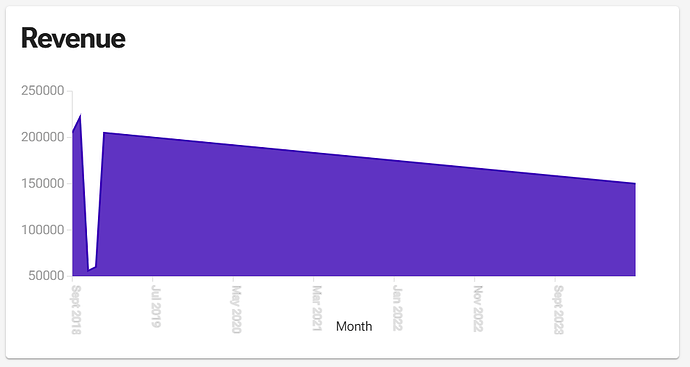Can't speak for other ways to do it but here's how i formatted the Category Axis labels. In this case i was rotating the labels vertically and didn't want the month datetime to take up so much vertical space. In short you call your own .cs function so instead of the @context.value you use @(MyFormatMonthYear(context.Value))
In the code-behind .cs page add your own function to your class:
public string MyFormatMonthYear(object value)
{
string s = "";
s = ((DateTime)value).ToString("MMM yyyy") ;
return s;
}
in the .razor page..
<RadzenRow>
<RadzenColumn SizeXL="6" SizeXX="6" SizeXS="12">
<RadzenCard Style="margin-bottom: 16px">
<RadzenHeading Text="Revenue" ></RadzenHeading>
<RadzenChart Style="width: max; height: max; margin: 50px; margin-top: 0px;
margin-right: 0px; margin-left: 0px; margin-bottom: 10px">
<RadzenCategoryAxis >
<RadzenSeriesDataLabels Visible="true"></RadzenSeriesDataLabels>
<RadzenAxisTitle Text="Month"></RadzenAxisTitle>
<RadzenTicks>
<Template>
<text class="custom-category-label" style="text-anchor: start; transform: translate(@(context.X)px, @(context.Y + 10)px) rotate(90deg)">
@(MyFormatMonthYear(context.Value))
</text>
</Template>
</RadzenTicks>
</RadzenCategoryAxis>
<RadzenLegend Visible="false"></RadzenLegend>
<RadzenValueAxis FormatString="" ></RadzenValueAxis>
<RadzenColumnOptions></RadzenColumnOptions>
<RadzenAreaSeries TItem="Pages.Index.RevenueByMonth" Data="@_revenueByMonth" CategoryProperty="Month"
ValueProperty="Revenue"></RadzenAreaSeries>
</RadzenChart>
</RadzenCard>
</RadzenColumn>
</RadzenRow>
